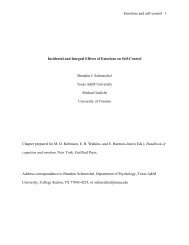A cognitive control perspective of self-control strength - ResearchGate
A cognitive control perspective of self-control strength - ResearchGate
A cognitive control perspective of self-control strength - ResearchGate
You also want an ePaper? Increase the reach of your titles
YUMPU automatically turns print PDFs into web optimized ePapers that Google loves.
198 A Cognitive Control Perspective<br />
Endnote<br />
* Correspondence address: Michael Robinson, Psychology (NDSU Department 2765), PO Box 6050, Fargo, ND<br />
58108-6050, USA. Email: Michael.D.Robinson@ndsu.edu<br />
References<br />
Ackerman, P. L. (1987). Individual differences in skill learning: An integration <strong>of</strong> psychometric and information<br />
processing <strong>perspective</strong>s. Psychological Bulletin, 102, 3–27.<br />
Anderson, C. A., Berkowitz, L., Donnerstein, E., Huesmann, L. R., Johnson, J. D., Linz, D., et al. (2003). The<br />
influence <strong>of</strong> media violence on youth. Psychological Science in the Public Interest, 4, 81–110.<br />
Bargh, J. A. (1997). The automaticity <strong>of</strong> everyday life. In R. S. Wyer (Ed.), Advances in Social Cognition (Vol. 10,<br />
pp. 1-61). New York: Lawrence Erlbaum Associates.<br />
Bargh, J. A., & Chartrand, T. L. (1999). The unbearable automaticity <strong>of</strong> being. American Psychologist, 54, 462–479.<br />
Baumeister, R. F., Heatherton, T. F., & Tice, D. M. (1994). Losing Control: How and Why People Fail at Self-Regulation.<br />
San Diego, CA: Academic Press.<br />
Baumeister, R. F., Muraven, M., & Tice, D. M. (2000). Ego depletion: A resource model <strong>of</strong> volition, <strong>self</strong>-regulation,<br />
and <strong>control</strong>led processing. Social Cognition, 18, 130–150.<br />
Baumeister, R. F., & Vohs, K. D. (2004). Handbook <strong>of</strong> Self-Regulation: Research, Theory, and Applications. New York:<br />
Guilford Press.<br />
Baumeister, R. F., & Vohs, K. D. (2007). Self-regulation, ego depletion, and motivation. Social and Personality Psychology<br />
Compass, 1, 115–128.<br />
Brown, K. W., & Ryan, R. M. (2003). The benefits <strong>of</strong> being present: Mindfulness and its role in psychological<br />
well-being. Journal <strong>of</strong> Personality and Social Psychology, 84, 822–848.<br />
Bushman, B. J., & Anderson, C. A. (2001). Media violence and the American public: Scientific facts versus media<br />
misinformation. American Psychologist, 56, 477–489.<br />
Collins, A. M., & L<strong>of</strong>tus, E. F. (1975). A spreading-activation theory <strong>of</strong> semantic processing. Psychological Review,<br />
82, 407–428.<br />
Compton, R. J., Arnstein, D., Freedman, G., Dainer-Best, J., Liss, A., & Robinson, M. D. (2009). Post-error<br />
slowing and neural markers <strong>of</strong> error detection predict daily coping with stress. Manuscript submitted for<br />
publication.<br />
Compton, R. J., Robinson, M. D., Ode, S., Quandt, L. C., Fineman, S. L., & Carp, J. (2008). Error-monitoring<br />
ability predicts daily stress regulation. Psychological Science, 19, 702–708.<br />
DeWall, C. N., Baumeister, R. F., Stillman, T. F., & Gailliot, M. T. (2007). Violence restrained: Effects <strong>of</strong> <strong>self</strong>regulation<br />
and its depletion on aggression. Journal <strong>of</strong> Experimental Social Psychology, 43, 62–76.<br />
Duncan, S., & Barrett, L. F. (2007). Affect is a form <strong>of</strong> cognition: A neurobiological analysis. Cognition and Emotion,<br />
21, 1184–1211.<br />
Eagly, A. H., & Steffen, V. J. (1986). Gender and aggressive behavior: A meta-analytic review <strong>of</strong> the social psychological<br />
literature. Psychological Bulletin, 100, 309–330.<br />
Eisenberger, N. I., Lieberman, M. D., & Williams, K. D. (2003). Does rejection hurt An fMRI study <strong>of</strong> social<br />
exclusion. Science, 302, 290–292.<br />
Falkenstein, M., Hoormann, J., Christ, S., & Hohnsbein, J. (2000). ERP components on reaction errors and their<br />
functional significance: A tutorial. Biological Psychology, 51, 87–107.<br />
Ferguson, M. J., Hassin, R., & Bargh, J. A. (2008). Implicit motivation: Past, present, and future. In J. Y. Shah &<br />
W. L. Gardner (Eds.), Handbook <strong>of</strong> Motivation Science (pp. 150–166). New York: Guilford Press.<br />
Freud, S. (1957). The unconscious. In J. Strachey (Ed. and Trans.), The Standard Edition <strong>of</strong> the Complete Psychological<br />
Works <strong>of</strong> Sigmund Freud (Vol. 14, pp. 159–215). London: Hogarth Press. (original work published 1915)<br />
Fujita, K., & Han, H. A. (2009). Moving beyond deliberative <strong>control</strong> <strong>of</strong> impulses: The effect <strong>of</strong> construal levels on<br />
evaluative associations in <strong>self</strong>-<strong>control</strong> conflicts. Psychological Science, 20, 799–804.<br />
Gailliot, M. T., Baumeister, R. F., DeWall, C. N., Maner, J. K., Plant, E. A., Tice, D. M., et al. (2007). Self-<strong>control</strong><br />
relies on glucose as a limited energy source: Willpower is more than a metaphor. Journal <strong>of</strong> Personality and<br />
Social Psychology, 92, 325–336.<br />
Gehring, W. J., & Knight, R. T. (2000). Prefrontal-cingulate interactions in action monitoring. Nature Neuroscience,<br />
3, 516–520.<br />
Goldberg, E. (2001). The Executive Brain: Frontal Lobes and the Civilized Mind. New York: Oxford University Press.<br />
Greenwald, A. G., McGhee, D. E., & Schwartz, J. L. K. (1998). Measuring individual differences in implicit cognition:<br />
The implicit association test. Journal <strong>of</strong> Personality and Social Psychology, 74, 1464–1480.<br />
Hajcak, G., Moser, J. S., Yeung, N., & Simons, R. F. (2005). On the ERN and the significance <strong>of</strong> errors. Psychophysiology,<br />
42, 151–160.<br />
Higgins, E. T., & Bargh, J. A. (1987). Social cognition and social perception. Annual Review <strong>of</strong> Psychology, 38, 369–<br />
425.<br />
ª 2010 The Authors Social and Personality Psychology Compass 4/3 (2010): 189–200, 10.1111/j.1751-9004.2009.00244.x<br />
Journal Compilation ª 2010 Blackwell Publishing Ltd



